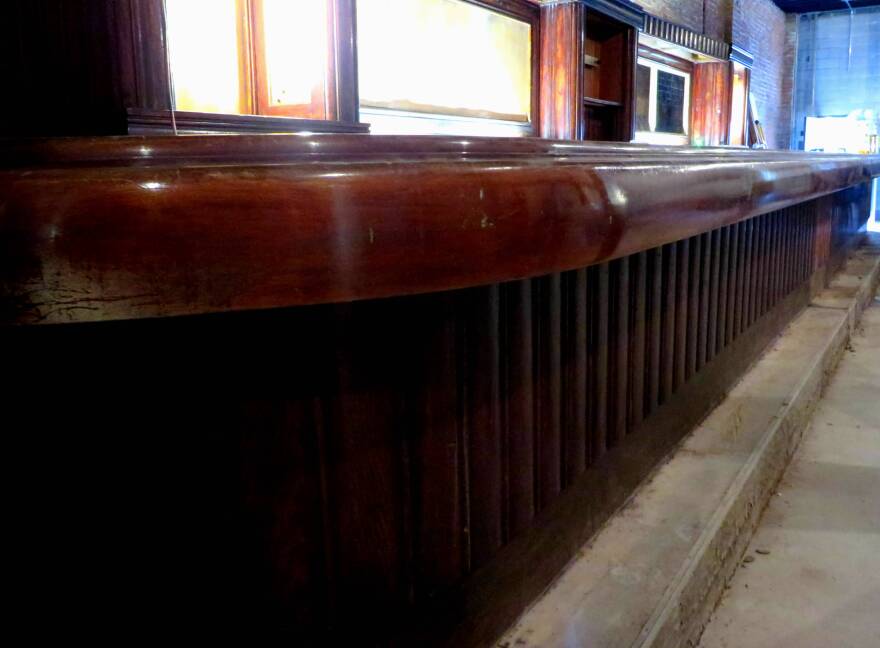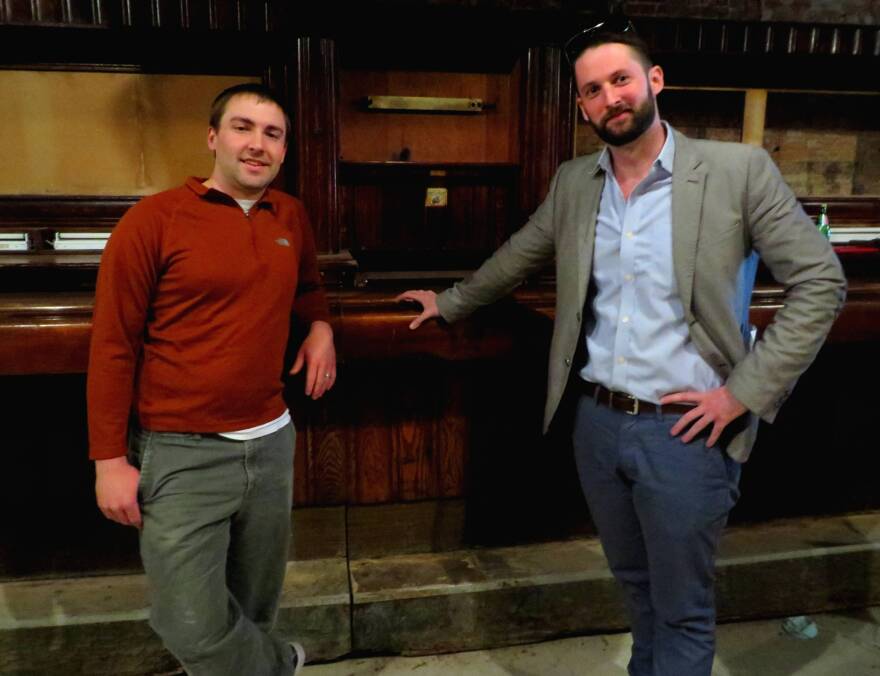The City of Detroit might be going through bankruptcy, but the commerce of Detroit is growing in some areas. A new business that will open this summer is the latest in a fast-growing trend.
Tucked away in the Eastern Market on Riopelle Street is a nondescript building. Go through the squeaky, jail-like door and you'll see one of Michigan’s newest whiskey, gin, and vodka distillers, the Detroit City Distillery.
Right now, though, it’s mostly a dusty construction site. There are no whiskey barrels here- yet. They’re stored at a licensed facility. There’s no copper pot still- yet. It’s being manufactured in Germany right now.
But they do have a classic wooden bar. Michael Forsyth and his partners found it in a vacant storefront in downtown Detroit and bought it.

This is the second distillery in Detroit and it’s among some three dozen in the state.
“The reason you’re seeing a lot of distilleries start right now is there’s unmet demand. Just like when the craft beer industry started, there’s been a movement where people care about what goes into their product. So, they want to know where the ingredients came from. They want to know how it was made,” Forsyth said.
The distillers use Michigan grain and the cocktails they'll serve will be made with Eastern Market produce.
Chuck Gellasch is a veteran mixologist who will be showcasing the spirits distilled on the premises.

“We want everybody to feel comfortable coming in here. So, our drinks are going to be very approachable, using fresh produce from the market. We’ll make all our own syrups and bitters and things in house,” Gellasch said.
The guy behind the distillery’s spirits, the scientist of the partners, is J.P. Jerome. He’s looking forward to soon producing the good stuff here. But, after waiting for the federal license, and the state inspection, they’ll still have to get through all the Detroit city permitting.
“The local codes and inspection is probably the harder piece of the puzzle considering we are making a flammable product. So, we’re regulated fairly tightly by multiple arms of the Building Department. So, we have a lot of extra safety pieces to our building,” Jerome explained.
But these guys still know even with all the licenses, inspections, and permits, things are easier on distillers now than they were just a few years ago. Michael Forsyth says it used to be distillers couldn’t sell or serve spirits at the distillery.
“That’s one of the great things about distillery policy in Michigan is that you can sell what you produce on site direct to the consumer,” Forsyth said.
Changes in the state law spurred growth of distillery industry
The law changed when a distillery professor at Michigan State University, Kris Berglund, suggested Michigan law was getting in the way of a growing industry.
He contacted his local legislator in 2006. Barb Byrum is now the Ingham County Clerk. She says the legislation got bi-partisan support.
“Well, it allowed these agricultural entrepreneurs to test their product and to sell their product on premise. And all of the credit quite honestly goes to Dr. Berglund,” Byrum said. She added the legislation passed the House vote unanimously and with an overwhelming majority in the Senate.

Although they won’t open until late June or early July, the distillers offered this reporter a sample.
"This may be the first real or actual Detroit City Distillery cocktail, I think, made at this bar," Michael Forsyth said as we watched Chuck Gellasch mix the drinks. Oh, it was tasty!
Wider economic impact
I asked a cocktail class instructor, Tammy Coxen, to join me on this visit. She’s made a business of unique food and drink experiences, but her day job is with the non-profit Corporation for a Skilled Workforce. Its work includes dealing with Detroit area economic issues. She says besides the eight or ten people the Detroit City Distillery might employ directly, there’s a bigger story.
“When you look at the spillover effects and the fact that they’re bringing money into the community, they’re spending that money on local Detroit merchants at the farmers’ market, they’re spending it in the state to buy their grains. All that money is being returned to the state of Michigan and that’s going to drive jobs and economic development as well,” Coxen said.
When you multiply that by the number of new distilleries in the state, the economic impact adds up.
And the partners at Detroit City Distillery know they're making a small difference in Detroit and the state. They’re proud of it. But for the alchemist of these business guys, J.P. Jerome, it’s mostly about coming up with unique spirits that get people excited.
Correction: An earlier version of this story misspelled Chuck Gellasch's name.
Support for the Detroit Journalism Cooperative on Michigan Radio comes from the John S. and James L. Knight Foundation, Renaissance Journalism's Michigan Reporting Initiative, and the Ford Foundation.





